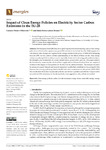Impact of Clean Energy Policies on Electricity Sector Carbon Emissions in the EU-28

Use este enlace para citar
http://hdl.handle.net/2183/37233
A non ser que se indique outra cousa, a licenza do ítem descríbese como Atribución 4.0 Internacional (CC BY)
Coleccións
- Investigación (FEE) [923]
Metadatos
Mostrar o rexistro completo do ítemTítulo
Impact of Clean Energy Policies on Electricity Sector Carbon Emissions in the EU-28Data
2022Cita bibliográfica
Pineiro-Villaverde, G.; García-Álvarez, M.T. Impact of Clean Energy Policies on Electricity Sector Carbon Emissions in the EU-28. Energies 2022, 15, 1040. https://doi.org/10.3390/en15031040
Resumo
[Abstract] The European Union (EU) has developed important efforts in enacting various clean energy policies in order to reduce greenhouse gas (GHG) emissions in the last decades. Both supply-side and demand-side changes are required in the energy systems in the period of 2020–2030 and going towards 2050. In this context, a better understanding of the effects of these specific clean energy actions on reducing GHG emissions may be especially of interest for allowing policymakers to know the strengths and weaknesses of various climate-related power sector policies. This paper adds to the literature by presenting the effects of both supply-side and demand-side policies and empirical evidence of the impact of these policies on the reduction in carbon emissions. This analysis was done by means of a panel data set and several regression models that contribute to explaining the link between clean energy policies applied in the EU and carbon emissions over the period of 2000–2019. The results show that while supply-side policies have shown a positive and effective impact on the reduction in GHG emissions, on the demand side, more aggressive policy efforts are needed.
Palabras chave
Clean energy policies
Carbon dioxide emissions
Energy sector
Renewable energy
Energy taxes
Panel data
Carbon dioxide emissions
Energy sector
Renewable energy
Energy taxes
Panel data
Versión do editor
Dereitos
Atribución 4.0 Internacional (CC BY)
ISSN
1996-1073
Ítems relacionados
Mostrando ítems relacionados por Título, autor ou materia.
-
Estudo enerxético e proposta de mellora dun edificio residencial situado en Touro (A Coruña)
Ares Igrexas, Iván (2021)[Resumo] O presente traballo ten a finalidade a de ser o proxecto de fin de grao da titulación do Grao en Arquitectura Técnica na Universidade da Coruña. A realización do mesmo foi supervisada polos profesores Juan Luís ... -
Methodology to Calculate the Costs of a Floating Offshore Renewable Energy Farm
Castro-Santos, Laura; Martins, Elson; Guedes Soares, Carlos (Multidisciplinary Digital Publishing Institute, 2016)This paper establishes a general methodology to calculate the life-cycle cost of floating offshore renewable energy devices, applying it to wave energy and wind energy devices. It is accounts for the contributions of the ... -
An approach to Energy Planning in Germany - Energy Transition towards a low-carbon economy: Analysis and application of Modern Portfolio Theory to the German Electricity Mix
Afonso Arévalo, Javier Eduardo (2020)[Abstract]: The targets of this Final Degree Thesis are to explain the current situation of the German Energy Sector, its evolution over time, to compare its features with the European Union Energy Sector, and finally, to ...






